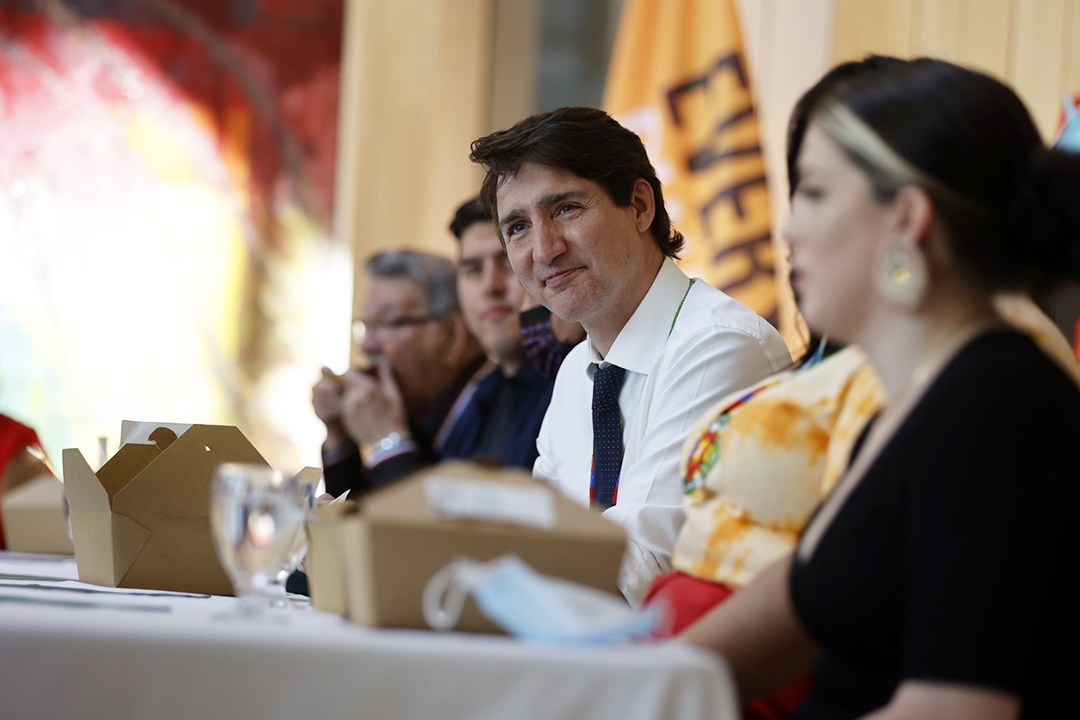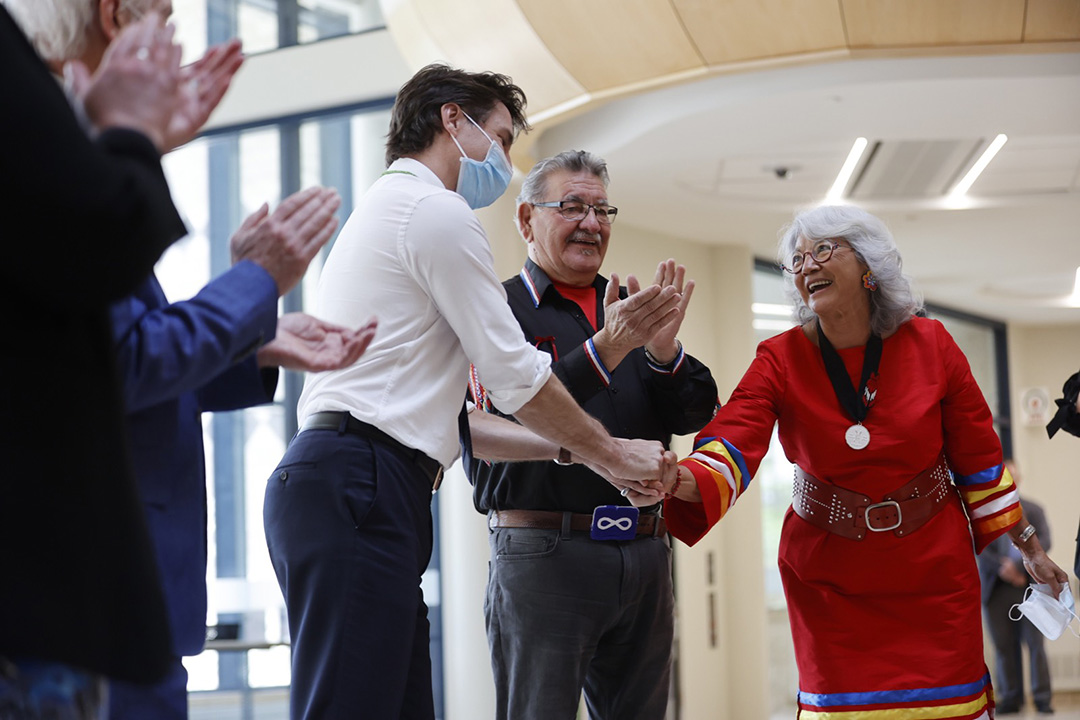
USask hosts the Prime Minister of Canada
Prime Minister Justin Trudeau paid tribute to the contributions the University of Saskatchewan (USask) has made to scientific discovery, as he wrapped up his visit to campus on Wednesday.
By UNIVERSITY COMMUNICATIONS
He wound up a day of tours meeting with staff, board and leadership from the Vaccine and Infectious Disease Organization (VIDO) at USask, and thanked them for their efforts at this moment in history.
“Everyone here at VIDO and USask stepped up when the pandemic hit and everyone needed to spring into action and it’s because you’ve been working on this for a long time, and it showcases the best of Canada and the best of Saskatchewan,” said Trudeau.
“These are beautiful buildings, but that doesn’t mean anything if it is not for the extraordinary people who believe in this, who set aside so much time to focus on science and on serving their fellow citizens of the world.”
The prime minister met with top students and toured innovative spaces and unique research facilities throughout the day. USask President Peter Stoicheff, interim Vice-Provost of Indigenous Engagement Angela Jaime, and select students were in attendance at Gordon Oakes Red Bear Student Centre to greet the prime minister and take part in an open discussion to begin the tour. The Gordon Oakes Red Bear Student Centre is USask’s intercultural gathering place that is purpose-driven to build Indigenous engagement on campus.
“Everyone here at VIDO and USask stepped up when the pandemic hit and everyone needed to spring into action and it’s because you’ve been working on this for a long time, and it showcases the best of Canada and the best of Saskatchewan,” said Trudeau.
“These are beautiful buildings, but that doesn’t mean anything if it is not for the extraordinary people who believe in this, who set aside so much time to focus on science and on serving their fellow citizens of the world.”
The prime minister met with top students and toured innovative spaces and unique research facilities throughout the day. USask President Peter Stoicheff, interim Vice-Provost of Indigenous Engagement Angela Jaime, and select students were in attendance at Gordon Oakes Red Bear Student Centre to greet the prime minister and take part in an open discussion to begin the tour. The Gordon Oakes Red Bear Student Centre is USask’s intercultural gathering place that is purpose-driven to build Indigenous engagement on campus.

He had a list of questions to ask, focused on removing barriers for First Nations people in economic development.
“I wrote them down in case I got nervous,” he said. “I never thought a chance like this would happen.”
Following the lunch meet-and-greet, Trudeau toured the university’s Crop Development Centre (CDC) research plots and VIDO.
“The University of Saskatchewan is recognized as a national leader in everything from crop development to vaccine research to Indigenous initiatives, and it was our honour to showcase those areas and more for Prime Minister Justin Trudeau,” said USask President Peter Stoicheff. “We have taken great strides in developing local solutions to national and global problems, while also building a campus community committed to the values of equity, diversity, and inclusion. We are grateful for the ongoing federal support for our university facilities and programs and appreciated having the opportunity to spotlight some of USask’s achievements and advancements for the prime minister.”
USask Vice-President Research Baljit Singh, College of Agriculture and Bioresources Dean Angela Bedard-Haughn and CDC Director Curtis Pozniak welcomed the prime minister and toured him through the research plots close to USask’s main campus. Bedard-Haughn provided an overview of the importance of soil and plant science and how research in these two areas can provide solutions to climate change.
Students were then given the opportunity to present their research supporting agricultural development in Saskatchewan and Canada. Demonstrations of how crop breeding and integrated agronomy plays a role in climate, soil and food security were provided by USask students Adam Carter, Alex Waldner and Warren McCauley. A drone demonstration led by student Hansanee Fernando showed the importance of using technology for precision agriculture and how it can help agricultural researchers observe and monitor crop traits.
Waldner completed her undergraduate degree at USask, and just started her master’s degree in the forage program. She shared a breeder plot of hybrid wheat grass, bred to show improved salt tolerance. She explained to the prime minister that growing forage in saline areas can have environmental benefits.
“Agriculture has always been part of my life,” Waldner said, adding she grew up on a ranch near Swift Current. “Sustaining it for future generations is very important to me.”
The prime minister also took part in a private tour of VIDO’s secure research facilities alongside Volker Gerdts, VIDO director, Trina Racine, associate director of vaccine development, and Ryan Thompson, chair of VIDO’s board of directors.
VIDO is establishing itself as Canada’s Centre for Pandemic Research, offering cutting-edge research and vaccine development to combat infectious diseases. The VIDO team is in the process of expanding infrastructure to a containment Level 4 facility – the highest possible containment level – as well as building manufacturing capacity.
With key research facilities developed in part by generous funding provided by the Government of Canada in response to the COVID-19 pandemic and the need for an expanded Canadian biomanufacturing industry, Trudeau had the opportunity to engage with VIDO staff and students about leading Canada’s biomanufacturing future.
This was Trudeau’s third visit to USask as prime minister.
